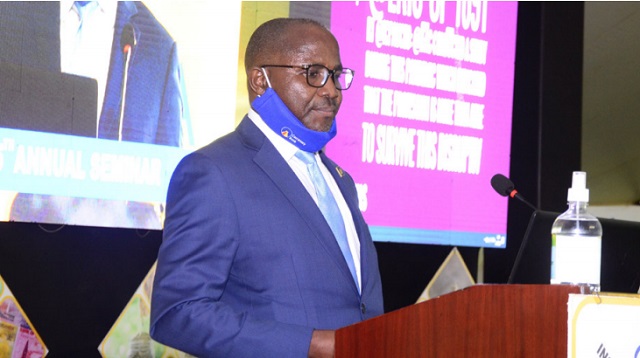
Top executives at PSFU, Centenary Bank and NSSF share ideas
Kampala, Uganda | JULIUS BUSINGE | These are tough times. New strategies have to be designed and implemented by business managers to achieve success during and post-COVID-19 era.
This was the general message that came out of the speeches of three important business executives that spoke at the 25th Institute of Certified Public Accountants of Uganda seminar that happened in Entebbe from Nov.25-27. A total of 200 participants attended physically and slightly over 500 via zoom.
Addressing participants as a keynote speaker, Elly Karuhanga, the chairman for Private Sector Foundation Uganda which is Uganda’s umbrella body for the private sector, made up of 230 business associations, corporate bodies and the major public-sector agencies said all players in the economy must understand that business is not as usual as the impact of COVID-19 lockdown continues to impact businesses negatively. He said all players including the private sector, government and professional bodies have a role to play to reverse this “very serious situation.”
“No business can grow without the services of an accountant or other professionals,” he said.
He said poverty levels have increased. Jobs have been lost and demand for goods and services has declined. Tax collections are not good, profits in companies are reducing and companies are finding it hard to meet their credit obligations or even pay dividends to shareholders.
He said the move to borrow about Shs4.3trillion locally by government to plug revenue gaps is good for service delivery but bad for the private sector competing for the same funds to revive their businesses.
“The URA is going to be more aggressive on businesses in terms of audits to ensure that it collects taxes to support government expenditure plans,” Karuhanga said.
Going forward, he said, businesses will achieve success by investing in technology including artificial intelligence, encouraging skilling and re-skilling of workers to meet the current growing demand of society.
They must also invest in health and safety systems, improve corporate governance and financial accountability and reporting.
He also said government has to increase citizen participation in policy making, accountability and delivery of goods and services.
That it must enact laws that support mobilisation of long term savings and make capital available for businesses while also changing the tax system from one that aims at aggressive collection to one that supports development.
In what appeared to be complementing Karuhanga’s ideas, Richard Byarugaba, the managing director for National Social Security Fund, said businesses and workers need to rethink skills through continuous learning to position “ourselves to remain competitive in the talent market.”
“The talent market has become ever more competitive as larger companies are able to sweep up the best talent and pay them well,” Byarugaba said, adding: “expect more jobs to be automated and this will be gradual and not a big bang.”
He added that individual talent will increasingly become branded assets for hire and that unique talent will become too expensive to keep on the payroll.
As technology automates more and more routine tasks, making it relevant for us to focus on the unique skills like interpreting big data, the talent market will bend towards unique skills, he added.
In the end, he said, leveraging technologies will continuously improve productivity and provide companies with cheaper, alternative costs of production.
Fabian Kasi, the managing director for Centenary Bank, said the current hard times have been made worse by hardships in movement, limited social interaction, increased use of technology, working from home and harsh economic environment.
But he said, every cloud has a silver lining – opportunities to take account of and rethinking business models to attain efficiency, financial inclusion, and reduction in use of cash, financial literacy and increase in savings. He preached about leadership and management and said managers must control risk while leaders take controlled risk.
“…therefore in hard times, there is need for both strong management and leadership,” Kasi said. “Above all, do not fear responsibility or making mistakes.”
In terms of behavioral responses, Kasi said, two things matter – agility and swiftness. That in the new world, it is not the big fish that eats the small fish but rather the fast fish eats the slow fish. “It is no longer the survival of the fittest but rather for the fastest.”
In terms of change management and transformation, Kasi said, managers need to understand the need for change while bearing in mind it comes with numerous challenges. He also called for the need to involve all stakeholders – resistors 20%, bystanders 60%, helpers 10% and champions 10% – if managers are to succeed in business.
Kasi also said it is important to recruit change agents, develop a strategy and vision which should be tangible, desirable, feasible, flexible, focused and simple in line with the company’s communication and growth strategies.
“Act and take action,” he said, adding: “consolidate with quick wins and celebrate…plan for quick wins and follow quick wins with new targets.”
Hard times, according to Kasi, requires breaking down boundaries, refocusing and reallocating resources and encouraging divergent views.
Above all, Kasi said, a manager must understand and map all three domains of performance – financial, operational and behavioral.
****
 The Independent Uganda: You get the Truth we Pay the Price
The Independent Uganda: You get the Truth we Pay the Price



